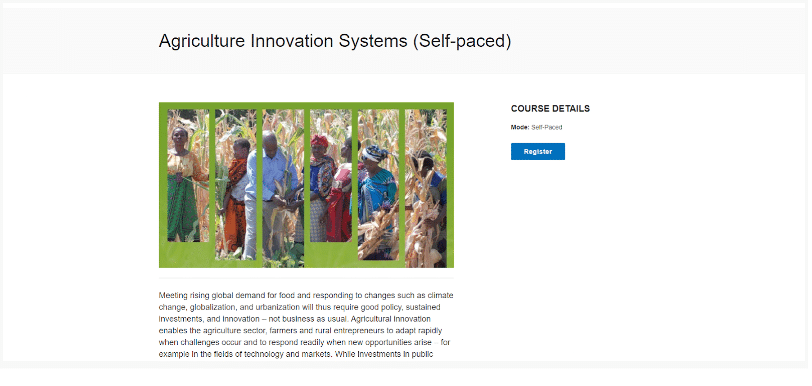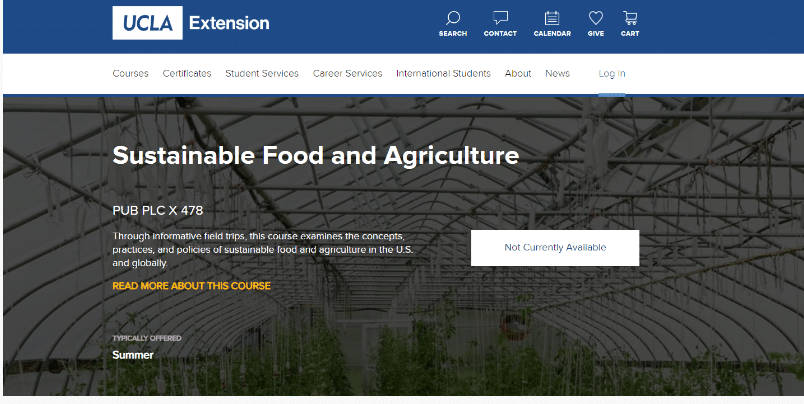Welcome to an enlightening journey through the world of agriculture and its indelible mark on human civilization and the planet.
This guide is designed to provide a deep dive into the multifaceted role of agriculture, from its historical roots to the modern challenges and innovations shaping its future.
Each section is accompanied by recommended courses and resources to enhance your understanding and knowledge.
But first, check out the ‘Agriculture and the World We Live In’ course by Open2Study below.
Overview: Agriculture And The World We Live In (Agri)
This course is designed to explore the vital role of agriculture in our daily lives and its impact on the world. Perfect for beginners, students, and anyone interested in understanding how food is produced, the challenges of sustainable farming, and the future of food security.
Through simple explanations, real-life case studies, and engaging discussions, participants will gain insights into the complexities of modern agriculture and its significance in environmental sustainability, economy, and global health.
Course Syllabus Preview:
Our course syllabus is structured to ensure a comprehensive understanding of agriculture and its global implications, making it accessible and engaging for all learners. Here’s an overview of the major topics and their subtopics:
I. Introduction to Agriculture
- The History of Agriculture
- Basic Principles of Crop Production and Animal Husbandry
- The Role of Agriculture in Society
II. Farming Techniques and Technologies
- Traditional vs. Modern Farming Practices
- The Use of Technology in Agriculture
- Organic Farming and Alternative Agricultural Systems
III. Environmental Impact of Agriculture
- Agriculture and Climate Change
- Water Use and Management in Farming
- Soil Health and Conservation Practices
IV. Agriculture and Economy
- The Global Food Market
- Agriculture’s Role in Economic Development
- Challenges of Small-Scale Farming
V. Food Security and Nutrition
- Understanding Food Security
- The Impact of Agriculture on Nutrition
- Addressing Hunger and Malnutrition
VI. Sustainable Agriculture
- Principles of Sustainable Farming
- Strategies for Achieving Sustainability in Agriculture
- The Future of Food Production
VII. Agriculture Policy and Global Challenges
- National and International Agriculture Policies
- The Impact of Trade on Agriculture
- Addressing Global Challenges Through Agriculture
What You Will Learn
By joining this course, participants will gain:
- Foundational Knowledge: Understand the basics of agriculture, including crop and animal production.
- Awareness of Environmental Impact: Learn about the environmental challenges associated with agriculture and strategies for sustainable farming.
- Insights into Food Security: Explore the issues of food security, nutrition, and the global food supply chain.
- Understanding of Agricultural Economics: Gain insights into the economic aspects of agriculture and its role in global markets.
- Knowledge of Policies and Global Challenges: Understand the policies affecting agriculture and how they can address global challenges.
This Course Includes:
- 12 Hours of On-Demand Video: Engaging video lectures that provide in-depth coverage of agriculture and its global significance.
- 6 Comprehensive Articles: Supplementary reading materials to enhance your understanding of agricultural topics.
- 8 Downloadable Resources: Access to additional information, guides, and tools to support your learning.
- Mobile and TV Access: Study from anywhere, anytime, with lessons available on both mobile and TV.
- Certificate of Completion: Showcase your commitment to learning and your newfound knowledge in agriculture.
Popular Alternatives To Agriculture And The World We Live In (Agri)
Here are a few popular alternatives to our course on the key topic of agriculture and the world we live in, which are classified into three categories:
A. The Neolithic Revolution and the Rise of Civilization
The advent of agriculture approximately 12,000 years ago marked a turning point in human history, leading to the rise of civilizations. This section explores how the domestication of plants and animals facilitated settled life, social complexity, and the development of technology.
Courses:
1. The Development Of Agriculture Course
| Course Link | Here |
| Pricing | $143.75 |
The course on the Development of Agriculture delves into the transformative period about 12,000 years ago when humans shifted from nomadic hunter-gatherer lifestyles to permanent settlements and farming.

This significant change, often referred to as the “Neolithic Revolution,” marked the beginning of agriculture, leading to the growth of cities and civilizations and a dramatic increase in the global population.
What it offers:
- Grades: Suitable for students from grades 3 to 12.
- Subjects Covered: Social Studies, World History.
- Key Topics:
- The Farming Revolution: Understanding how agriculture triggered societal changes and the development of permanent settlements.
- Plant Domestication: Insights into the domestication of crops like wheat, barley, and peas and the origins of rice and millet farming.
- Farmed Animals: The domestication of cattle, goats, sheep, and pigs in the Fertile Crescent and their impact on human societies.
What will I learn?
- The origins and impact of the Neolithic Revolution on human society and the environment.
- The process of plant domestication and the regions where various crops were first cultivated.
- The history and significance of animal farming, including the domestication of key livestock species and the genetic adaptations that allowed humans to thrive on dairy products.
- The role of agriculture in the development of human civilizations and its influence on global population growth.
Where could this lead me?
Understanding the development of agriculture provides foundational knowledge for careers in:
- Agricultural Science: Insights into crop and animal domestication can lead to careers in agricultural research, sustainability, and biotechnology.
- History and Archaeology: A deeper understanding of human history, particularly the Neolithic Revolution, is crucial for careers in historical research, archaeology, and education.
- Environmental Science: Knowledge of the origins of agriculture informs careers focused on sustainable farming practices, conservation, and environmental policy.
- Global Studies: Understanding the impact of agriculture on human societies contributes to careers in international relations, global food security, and development studies.
2. The World Bank’s Agriculture Innovation System
| Course Link | Here |
| Pricing | Free |
The World Bank’s focus on agriculture aims to harness the sector’s potential to reduce poverty, enhance shared prosperity, and ensure food security for a projected population of 10 billion by 2050.

Agriculture is pivotal for economic growth, especially in developing countries, and is significantly more effective in raising incomes among the poorest compared to other sectors.
What it offers:
- Economic Impact: Agriculture accounts for 4% of global GDP and, in some developing countries, over 25% of GDP.
- Poverty Reduction and Food Security: Agricultural development is a key strategy for ending extreme poverty and feeding the global population sustainably.
- Environmental Sustainability: Addressing the challenges of climate change, food loss, waste, and the environmental impact of current food systems.
What will I learn?
- The critical role of agriculture in achieving global development goals, including poverty reduction and economic growth.
- The challenges facing agriculture, such as COVID-19 disruptions, climate change, and global food crises, and strategies to overcome them.
- The importance of sustainable and inclusive food systems in improving food and nutrition security and reducing environmental impact.
- The impact of poor diets and food insecurity on global health and strategies to address malnutrition and ensure access to healthy diets.
Where could this lead me?
Engagement with the World Bank’s agriculture sector could lead to opportunities in:
- Policy and Development: Shaping agricultural policies that promote economic growth, poverty reduction, and environmental sustainability.
- Research and Innovation: Contributing to solutions that address the challenges of climate change, food security, and sustainable agriculture.
- Global Health: Working on initiatives to improve nutrition and combat the global health impacts of poor diets and food insecurity.
- Environmental Conservation: Developing and implementing strategies to reduce the environmental footprint of food systems and promote sustainable practices.
B. Climate Change and Agriculture
Learn about the intricate relationship between agriculture and climate change, including the sector’s vulnerability to and impact on climate patterns, as well as adaptation and mitigation strategies.
Course:
3. Forest Carbon Science, Policy & Management
| Course Link | Here |
| Pricing | $884 credit hour |
This bulletin from MSU Extension provides an in-depth look at the relationship between agriculture and climate change, focusing on field crop production. It explores how greenhouse gases are related to agriculture and the potential impacts of climate change on field crop agriculture.

It also discusses strategies for mitigation and sequestration to combat climate change within the context of field crop growing.
What it offers:
- An explanation of how field crop agriculture emits and consumes greenhouse gases, affecting climate change.
- Insights into the specific greenhouse gases related to field crop agriculture, such as carbon dioxide (CO2) and nitrous oxide (N2O), and how agricultural practices impact these emissions.
- A detailed look at the contribution of agriculture to greenhouse gas emissions in the United States, with agriculture accounting for about 7% of human-based emissions.
What will I learn?
- The direct and indirect effects of climate change on Michigan field crop agriculture include shifts in temperature, precipitation patterns, and extreme weather events.
- Positive and negative impacts of climate change on field crop agriculture, such as the potential for longer growing seasons and increased vulnerability to pests and diseases.
- Mitigation and sequestration strategies for field crop growers to reduce greenhouse gas emissions and remove CO2 from the atmosphere, including renewable energy sources, improved efficiency equipment, and better management of nitrogen fertilizer.
- The importance of adaptation and the role of agricultural management and policies in combating climate change.
Where could this lead me?
Engagement with the content of this bulletin could lead to opportunities in:
- Sustainable Agriculture: Implementing and advocating for practices that reduce the carbon footprint of field crop production.
- Environmental Policy and Advocacy: Shaping policies that support sustainable agricultural practices and mitigate the impacts of climate change.
- Agricultural Research and Development: Innovating new technologies and practices to improve the resilience of field crops to climate change and reduce greenhouse gas emissions.
- Agricultural Education: Teaching the next generation of farmers about sustainable practices and the importance of agriculture in the fight against climate change.
4. Sustainable Food And Agriculture Practices (Available in Summer)
| Course Link | Here |
| Pricing | Free |
UCLA emphasizes sustainable agriculture as a crucial industry for the global economy, biodiversity, and human societies.

Sustainable agriculture aims to preserve and restore critical habitats, protect watersheds, and improve soil health and water quality while addressing the urgent need for sustainable resource management amid rising agricultural demand.
What it offers:
- Insight into the Importance of Sustainable Agriculture: Agriculture employs over one billion people worldwide, generating more than $1.3 trillion in food annually. Sustainable practices in agriculture can significantly mitigate environmental impacts, contributing to biodiversity conservation and ecosystem health.
- Understanding the Impacts of Agriculture: UCLA outlines how unsustainable agricultural practices contribute to habitat loss, pollution, poverty, excessive water consumption, and climate change, highlighting the need for sustainable solutions.
- Strategies for Sustainable Management: UCLA advocates for sustainably managed agricultural operations that can preserve ecosystems, improve water quality, and ensure economic viability for producers.
What will I learn?
- The role of agriculture in environmental challenges and the potential for positive impacts through sustainable practices.
- The major drivers of deforestation and ecological destruction are linked to agricultural expansion, such as oil palm and soy production.
- The consequences of agricultural pollution include the impact of pesticides and fertilizers on ecosystems and human health.
- The significance of agriculture in water consumption and its effects on freshwater systems.
- The contribution of agriculture to climate change through practices like burning fields and land clearing for production.
Where could this lead me?
Engagement with sustainable agriculture practices could lead to opportunities in the following areas:
- Conservation and Environmental Science: Working on initiatives that aim to reduce agriculture’s environmental footprint and promote biodiversity.
- Sustainable Farming and Agribusiness: Implementing and promoting sustainable practices within the agricultural industry to improve efficiency and environmental outcomes.
- Policy and Advocacy: Shaping agricultural policies to support sustainable practices, reduce pollution, and address climate change.
- Research and Education: Contributing to the development of new sustainable agricultural technologies and educating the next generation of farmers and conservationists.
Conclusion
This guide serves as a starting point for anyone interested in understanding the critical role of agriculture in our world.
Whether you’re a student, professional, or simply curious, these resources offer valuable insights and learning opportunities to deepen your knowledge of agriculture’s past, present, and future.
Article By

